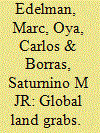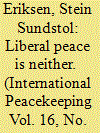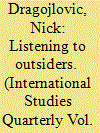|
|
|
Sort Order |
|
|
|
Items / Page
|
|
|
|
|
|
|
| Srl | Item |
| 1 |
ID:
124908


|
|
|
|
|
| Publication |
2013.
|
| Summary/Abstract |
Scholars, practitioners and activists generally agree that investor interest in land has climbed sharply, although they differ about what to call this phenomenon and how to analyse it. This introduction discusses several contested definitional, conceptual, methodological and political issues in the land grab debate. The initial 'making sense' period drew sweeping conclusions from large databases, rapid-appraisal fieldwork and local case studies. Today research examines financialisation of land, 'water grabbing', 'green grabbing' and grabbing for industrial and urbanisation projects, and a substantial literature challenges key assumptions of the early discussion (the emphasis on foreign actors in Africa and on food and biofuels production, the claim that local populations are inevitably displaced or negatively affected). The authors in this collection, representing a diversity of approaches and backgrounds, argue the need to move beyond the basic questions of the 'making sense' period of the debate and share a common commitment to connecting analyses of contemporary land grabbing to its historical antecedents and legal contexts and to longstanding agrarian political economy questions concerning forms of dispossession and accumulation, the role of labour and the impediments to the development of capitalism in agriculture. They call for more rigorous grounding of claims about impacts, for scrutiny of failed projects and for (re)examination of the longue durée, social differentiation, the agency of contending social classes and forms of grassroots resistance as key elements shaping agrarian outcomes.
|
|
|
|
|
|
|
|
|
|
|
|
|
|
|
|
| 2 |
ID:
091973


|
|
|
|
|
| Publication |
2009.
|
| Summary/Abstract |
This article discusses the attempts at state-building by international actors in the Democratic Republic of Congo (DRC). It uses this experience to discuss some of the obstacles and dilemmas facing external state-builders. I argue that attempts at state-building by foreign actors in the DRC have not had much success, and point out four reasons. First, insufficient resources have been provided. Second, donors have used a standardized approach that does not take local context sufficiently into account. Third, domestic power relations have been such that state-building has not served the interests of key actors. Finally, the policy has been based on a fixed, non-negotiable conception of what the state eventually should look like. Although all these factors have contributed to the failure to create a liberal state in the DRC, the last two appear to be more fundamental than the first and the second.
|
|
|
|
|
|
|
|
|
|
|
|
|
|
|
|
| 3 |
ID:
138300


|
|
|
|
|
| Summary/Abstract |
Does nationality disadvantage foreign actors when they attempt to persuade the American public? Using data from an online survey experiment administered to a sample of US citizens, we find that the nationality of British and French advocates only reduces persuasiveness among American Republicans with low levels of political awareness. Among American Democrats, credible French or British advocates can be more persuasive than a comparable American source. Overall, foreign messengers from friendly countries are not disadvantaged by nationality, as nationality has low political salience and other domestic characteristics (such as partisanship) dominate subjects' heuristic processing. When a foreign advocate's nationality does play a role, however, it is likely to lead to polarization in domestic audience attitudes.
|
|
|
|
|
|
|
|
|
|
|
|
|
|
|
|
|
|
|
|
|